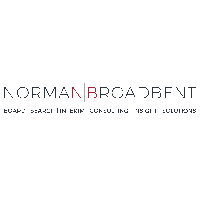Norman Broadbent Plc (LON:NBB) Chief Executive Officer Michael Brennan caught up with DirectorsTalk for an exclusive interview to discuss how the business has changed in the last 3 years, how it’s different from competitors, creating a balanced business, their research & insight part of the business & the future for the company.
Q1: Norman Broadbent, it’s a 40-year-old business which hasn’t made any group profit for a number of years. Now, that said, things seem to be changing and your results today show significant progress, how different is it now to when you came in nearly 3 years ago and took it over?
A1: A group of institutional investors approached me & asked me to come in as Group Chief Executive, the brand it’s iconic in the industry, it’s extremely well-known at very senior levels, particularly at Board level & the investors felt there was more we could do with the business.
The world of work is changing, people engage in talent in lots of different ways & it was felt that really what we ought to do was to update the company & really bring it into this century. It was a little bit archaic when I came in, it very much concentrated on one thing & that was executive search, my view was that we needed to turn it into something which was offering a much more holistic & related portfolio services. So, it needed to become more like the professional services company, so we’ve expanded the number of services we offer & they’re now at number five, so we’ve obviously kept a very strong footprint in the executive search market.
We’re dealing with leadership hires & C-suite hires, we’ve obviously got a very strong Board practice so we’re still working at Chairman level as well.
We then built a solutions business which fits in quite neatly so that’s up & coming talent, it’s next generation leaders, it’s ‘hard to find’ talent so that segs quite neatly into the search business.
We built an interim business so that is where we work with interim consultants who supply services to a company for 6 or 9 months. They often tend to be specialists in change & transformation or turnarounds, so these could be interim chief executives, interim chief marketing officers or they could be people who are helping a company that’s going through a regulatory issue or a technology change. So, we bought that business in & that tends to operate in & around C-suite.
We kept the consulting business which looks at assessment so that’s how companies can use science to make hiring decisions so that’s hiring the best person based on their psychological profile or understanding existing staff & finding out what their development needs might be & how you can develop them so that they’re fit for purpose going forward.
I think one of the most exciting things that we’ve done since I was Chief Executive is developing what we call research & insight. That’s where we’re using our existing research team & new research professionals we’ve hired & we’re providing business intelligence & market intelligence to clients & that’s helping them make better more informed decisions.
So, the company has moved on quite significantly in the last 2.5 years. We often say that a NBB year is like a dog year, we tend to get 7 times more things done in a year & I think the progress we’ve made in the last year certainly evidences that.
Q2: When you compare NBB to its competitors, what makes it different? Does it have a market differentiator or an edge to it?
A2: Yes, I think it does.
A number of our competitors tend to focus on one or two things, so it could be that they are just focussing on executive search, what we try to do is create something we call ‘total talent’. That means that we can work with a company at Board level & down to senior executive level & maybe a level below in that next generation talent.
We can bring a number of different services to play & we can deploy them in different ways, sometimes individually or sometimes we can bundle them up, so it helps bring better solutions to our clients problems. We help them not only fix a problem, but we also help them understanding where future problems might be, so we do a lot of kind of risk management work for a lot of people.
I think it’s that kind of approach & that kind of philosophy that we’ve got running through our company that really makes us stand out in the market today.
Q3: You mentioned that you wanted to create a balanced business in the results statement, what do you mean by that and why is it important?
A3: Our company is viewed by the stock market as being a very traditional executive search firm & what that means is we attract a relatively low valuation multiple. What we’re trying to do is bring in different types of revenue streams into the company.
Firstly, that’s driven by client demand but also, we want to make sure our investor proposition is strong as well. So, for example, if you look at an interim business, that would normally attract a PE of 12-15, if you look at a traditional executive search business, I think we’re the only one quoted in London, you’re looking at maybe 3, 4, possible 5 times. If you’re looking at solutions it’s 6 to 8 times, assessment, again high-quality earnings, you could be in the 10 or the 12’s, research & insight, it’s difficult to say what the PE would be because there isn’t a company that’s doing what we’re doing.
So, by us being able to offer a blended offering to our clients, it means that we’re getting lots of different revenue streams coming through, some of them are annuity incomes as opposed to single one-off fees. So, it de-risks the business, it means that we have more continuity of revenue, there’s more certainty of revenue, we’ve got more visibility so that helps create financial balance in the business, it helps us offer something new to clients but the flip side to all of that is that the investor proposition gets to be quite interesting.
What that should do is the market should then start to look at us & say actually this isn’t a typical traditional executive search business, it’s got other things going on in it which makes it quite interesting.
So, if we look at the gross profit split, that’s our revenue, if we look at the 2016 numbers, I think it was something like 79.5% of revenue came from executive research so that’s the lowest possible value type of revenue that we’ve got in the company. If you look at it today, on the results we’ve put out this morning, executive search is 54% & the rest of the business is 46% so the higher value revenue streams are starting to come through the business. That’s not because we’re depressing our activity in the executive search, it’s because we’ve got very very high growth levels coming through in these different parts of the business.
So, creating a balanced business means a number of different things.
Q4: The interim business, as you mentioned earlier, has done very well posting a 139% revenue uplift, what does it actually do?
A4: So, as I mentioned earlier, if you have a company that is going through a particular change programme or they’ve got a regulatory issue, it’s not always the best thing for them to go out & hire a full-time permanent employee because the problem might be fixed in 6 months. It could be that the talent they need to bring into the company is just very very difficult to find.
What there is in the market today is there’s a number of very seasoned, very experienced individuals who can be brought into a company for a short period of time to fix something. So, it could be a new tech platform is being installed, it could be that there’s an issue around strategy or execution of a particular programme, it could be that regulatory issue that I talked about.
Our interim business worked with these interim professionals, these consultants, & we place them in companies to help them fix problems, it could be something as the CFO is ill & therefore they’re on long-term leave or it could be that there’s some maternity leave required or that somebody resigns very quickly so that’s what we call gap fill. That’s a relatively small part of our business but it’s an obvious thing for us to do.
Where we really come into play & where we really excel is we put trouble-shooter’s into companies & help fix problems. If you think about how complex businesses become, if you think about the challenges that businesses face every day; it could be regulatory hurdles, it could be Brexit, it could be a new proposition to market, us being able to deploy these individuals at very very short notice, often within a week means that companies can fix things very very quickly.
It’s not just that but our interim business is very very unique in that we make sure there’s a very clean handover of all that IP that they’ve generated during that period of time when they’re consulting with our clients so there’s an almost seamless handover to the person who’s going to pick up after them.
Q5: You look to be growing your research & insight business, can you tell us or expand a little bit more on that?
A5: The research & insight business, that’s a really fascinating part of the business. There’s an interesting statistic out there & that is that something like a third of all executive recruitment searches fail & that’s often because the client hasn’t necessarily done the right level of due diligence in the market. So, just to put into context, the executive search market is worth about £1.5 billion a year in the UK so that means about £0.5 billion spent on recruitment, corporates are not necessarily getting the value back from that spend.
No, we’ve got a 95% closure rate, success rate, in this space & what we do is we have pulled together a research & insight business which can help clients in a number of different ways. So, we can help them de-risk their executive search so, for example, we will do due diligence on the market & we will help the client pull together the right candidate & job specification & that when the client goes to market to actually executive the search with us, they’ll be confident & know that they can find the right candidate at the right time at the right price.
It’s not just about de-risking, it’s also about other things. We’ve done something for a pharmaceuticals company recently that are looking to expand operations in Europe & they had to make a decision, do we go in Holland or do we go into Italy? What we did is we provided them with information on the market particularly around where the key talent was right which helped them make a decision as to where they wanted to go.
We’re doing a huge amount of worth in diversity so that’s a big big thing on the corporate agenda right now, about bringing people in from more diverse backgrounds & particularly around gender. So, we’re working with a FTSE250 to help them accelerate their hiring of executive level female talent.
So, it’s these kinds of things that we’re doing through our research & insight business which help create a new & different type of relationship with our clients & it stops them making mistakes. I think from a business perspective, it helps us build up a very visible pipeline of business going forwards which, again, adds a bit more stability & certainty to our business.
Q6: Finally, how would you describe the future for Norman Broadbent Plc?
A6: I don’t think we’ll be the biggest company in the market, I don’t think we’ll have offices all over the world, I think we will be known as being a very strong, professional, creative operator within this space of leadership acquisition & leadership advisory. I certainly think that the five services line that we’ve got will continue to go.
Can I foresee us getting in a situation where we may expand those services lines? Yes, I definitely think we will do that. The reason for that is we’re not like an oil tanker that takes a long time to turnaround in the ocean, we’re not like one of these giant firms where you’ve got really strong traditional imbedded cultures which resist change, we’re a very nimble business. Culturally, we’re entrepreneurial & I think that means we can be relevant & very fit for purpose as markets change in the future.







































